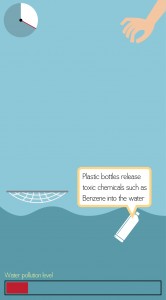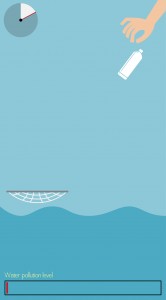Save The Wave: Students Design a Game to Raise Water Awareness
This contributed blog post is the result of a partnership between Lien AID and Year Two Advertising & Public Relations students from the School of Film & Media Studies at Ngee Ann Polytechnic. Students Geena Hui, Nurul Natasha, Benjamin Sim, Lisa Leong, and Shee Wen Shin contributed to create this. Lien AID thanks these students for their wonderful work.
Save the Wave!
The client: Lien AID.
The PR goal: To raise awareness as well as encourage action among Singapore youth to alleviate the problem of water pollution, in conjunction with Singapore World Water Day.
Being part of the younger generation ourselves, we understand the communication culture of our age group in order to be able to effectively connect and engage with our peers regarding this serious global issue – and especially from a youth-centric perspective.
We decided that the theme of our campaign would be “THE WAVE OF CHANGE”.
Why “the wave of change”?
One of the key messages of the campaign was that water pollution defies political and geographical borders, therefore water pollution of Singapore waters would indefinitely create a ripple effect and affect neighbouring countries. Through our campaign, we want to encourage youth to be the next wave (generation) to reduce water pollution globally.
Well, how did we arrive at our big idea?
Through intensive research, we found that students in Singapore are generally aware of water pollution as a global issue and agree that it should be addressed. However, most of them were not actively engaged to play their part to reduce water pollution. The general belief was that they have not contributed to water pollution, which was far from the truth and a misconception that we wanted to correct.
Therefore, in addition to emphasising the fact that water pollution is borderless, we wanted to encourage students who so strongly believe in preventing water pollution worldwide to act upon their belief by being advocates for this cause in their community.
How did we propose to tackle the problem?
One of the tactical ideas we came up with was an online game called “Save the Wave”.
This is how the game goes: The player will be tasked to protect the water body by preventing trash such as styrofoam boxes and plastic bottles to reach the surface of the water. Each object that falls into the water will darken the water, showing the decrease in water quality. A pop-up box would then appear, educating players about how the presence of the object can affect both human and marine life. We think this game would really engage our target publics as it is simple and fun, and similar games like Flappy Bird and Angry Birds are huge hits among youth.
At the end of the game, an encouraging and empowering message will be screened to remind players about the impact of water pollution in different countries and to encourage them to share the news with their Facebook friends.
As our main call-to-action is to get students to pledge to be “the wave of change”, we suggested holding mini-events in schools to spread the word and get students to pledge to be “the wave of change”. Our toolkit would consist of PDF posters, banners, pledge cards and T-shirts for students to download from our campaign website. Apart from targeting individuals, we also proposed to reach out to environment interest groups across these institutions to amplify our key messages and gather pledges to be “the wave of change”.
These are some of the PDF posters designed by our Creative Director Lisa Leong:
Overall, working on the Lien AID project was a great experience. After handling so many consumer-oriented campaigns in both advertising and PR, it was exciting to work on a project for a non-profit organisation, especially given that it would be for the greater good. The project gave us a well-rounded experience in planning a PR campaign, from extensive research on the issue of water pollution across the globe, to budgeting and even logistics.
Besides learning and planning for PR campaigns, this project also provided us the opportunity to learn more about water pollution in-depth and how it impacts the world. Water pollution is still greatly overlooked in Singapore, especially to youth. We are now certainly better equipped to educate the people around us about water pollution and help spread the word to alleviate water pollution in different ways together.
We are very grateful for the guidance from our lecturer and The Hoffman Agency mentors for giving us valuable feedback throughout the campaign planning process and helping us to determine whether our ideas were feasible. Last but not least, thank you Lien AID for this wonderful and enriching opportunity!











